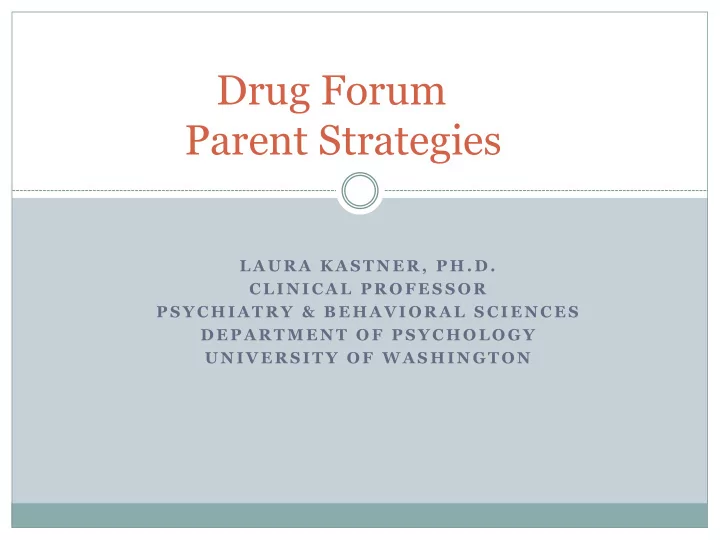

Drug Forum Parent Strategies L A U R A K A S T N E R , P H . D . C L I N I C A L P R O F E S S O R P S Y C H I A T R Y & B E H A V I O R A L S C I E N C E S D E P A R T M E N T O F P S Y C H O L O G Y U N I V E R S I T Y O F W A S H I N G T O N
Myths about Parenting Teens Teens have more psychological problems than other times in their lives Teens care more about their peer relationships than their parents during adolescence Parents should hide their own histories of substance use from their teens Parents should let their teens choose whether they participate in extracurricular activities Teens benefit from authoritarian parenting
Risk and Protective Factors- Individual Risk Protective Mental health problems Secure attachment with (e.g. ADHD, depression, parents anxiety) School problems Adaptable/resilient History of alcohol and drug temperament addiction in family History of difficulty in Intellectual strengths parent-child bond Self-regulation Conduct problems in school and legal system Social skills Substance experimentation < 6 th g Bonded to school
Risk and Protective Factors - Environmental Risk Protective Poverty Bonds to prosocial groups Racism, lack of opportunities/resources Ties to extended family Lack of prosocial role Involved with afterschool activities models/social support Bonds with adult Dangerous figures neighborhood Peer risk-taking
Risks and Protective Factors - Family Risk Protective Poor supervision Monitoring (Big 5) Permissive, disengaged or Authoritative parenting style authoritarian parenting style (warmth, + discipline + respect High conflict for teen’s thoughts & feelings) Difficulties in marital Good conflict resolution skills functioning or single Good parental self-regulation parenthood Parents – calm, collaborative Poor communication skills and confident Parental tolerance for deviance Good parent-child boundaries
Research shows that positive parenting results in “best outcomes” (achievement, relationships, psychological health, physical health) Kastner & Russell, Wise-Minded Parenting Incredible Years, Raising Healthy Families, Triple P
Best Outcomes! Warmth Authoritative Authority W Parenting Aps Permissive Authoritarian Psychological Autonomy (respect for thoughts and feelings) Neglectful/Indulgent Baumr umrind ind, , Stein inberg berg
7 Essentials for Raising Successful Teens Secure Self-Control Attachment Physical Academic Health Success Strong Social Character Thriving Emotional Flourishing
Secure attachment during teen years Does your teen feel like you accept her exactly the way she is? Would your teen say that you respect his feelings? Does your teen want your opinion and trust that you respect hers? Do you persevere and tolerate your teen’s argumentative and irritable moods to show affection and love? Do you stay involved and show concern despite your teen’s “go away” messages? Do you find ways to have fun and enjoy time together?
Authority – Rules, Consequences, Boundaries, Structure, Consistency, Credibility Rules – Non-negotiable -health/safety -values very important to the family Rules – Flexible (not above) - changes “in the interest of the teen” - made through careful analysis and parental unity - not flexed due to caving, winning popularity, fear
Monitoring Big Five W Questions (until college launch) Cooperation sets you free Where? 1. When (home)? 2. What (plan)? 3. 4. Who? Will you swear to call if plan changes? 5. (no last minute asks for curfew change, consequence for not answering phone, spot checks will occur)
Typical adolescence
Great Expectations (and communication) Articulate your expectations and listen to their views - abstinence = perfect safety and legality - insurance policy = educate and discuss - focus on safety first - emphasize “slowing down” for decision -making - use “science - speak” about substances and the brain, instead of lecturing and moralizing - use natural opportunities (news, local mishaps) and hypotheticals to trigger discussions
Family Structure & Routines Limit screens Homework time secured Eat dinner together and limit your own alcohol use Exercise, chores, sleep, take smart stuff out of room Mandate extracurricular activities (sports, talent, service) Clear expectations and privileges First, responsibilities and then earned privileges
School is priority Support your child’s scholastic development Be involved/volunteer at school Communicate academic expectations and values Get help if there are problems Everything goes downhill with academic failure
Communication tips Don’t engage in “power struggles” that are about how to think, and who is right. Focus on the important issues of health and safety. Model the language and tone of voice you expect from your teen. When communication deteriorates, take a time out. Practice “C.A.L.M.” Cool down, Assess your options, Listen with empathy, Make a plan. You are more accountable for self-control than teen is. Find win/win. (You want to go out and have fun, I want safe parameters)
ww.drugabuse.gov/family-checkup (Videos on how to and how not to communicate with your teen)
Recommend
More recommend